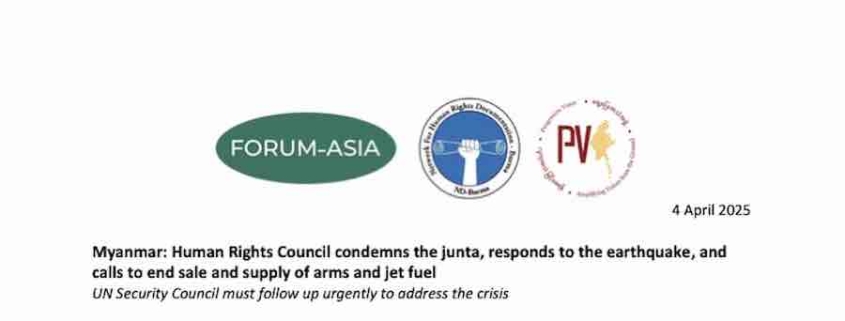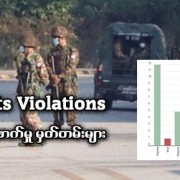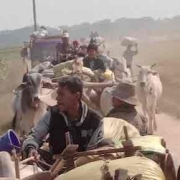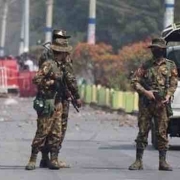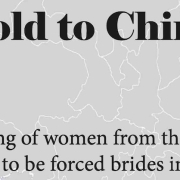MYANMAR: HUMAN RIGHTS COUNCIL CONDEMNS THE JUNTA, RESPONDS TO THE EARTHQUAKE, AND CALLS TO END SALE AND SUPPLY OF ARMS AND JET FUEL
4 April 2025
Myanmar: Human Rights Council condemns the junta, responds to the earthquake, and calls to end sale and supply of arms and jet fuel
UN Security Council must follow up urgently to address the crisis
The consensus adoption of the latest resolution on Myanmar at the 58th session of the UN Human Rights Council reflects the international community’s collective condemnation of the Myanmar military junta’s relentless campaign of violence and atrocities. While the resolution represents progress in international efforts to hold the Myanmar military junta accountable for its crimes, it also underscores critical gaps in the global response to Myanmar’s worsening human rights and humanitarian crisis.
Condemnation of Junta’s Atrocities
The resolution unequivocally condemns the military junta for its escalating violence against civilians, including indiscriminate airstrikes and artillery attacks. It holds the junta responsible for Myanmar’s deepening crisis and for its atrocities, which have left millions in urgent need of humanitarian assistance and displaced over 3.5 million people inside the country. It leaves no doubt that the military junta has absolutely no international legitimacy and is the root cause of Myanmar’s deepening human rights and humanitarian crisis.
The resolution expresses deep concern over the junta’s ongoing human rights violations—including extrajudicial killings, arbitrary arrests, torture, sexual violence, and the destruction of civilian infrastructure—that amount to war crimes and crimes against humanity under international law. It calls for an immediate cessation of all forms of violence and urges the military to release all arbitrarily detained persons.
Furthermore, the resolution highlights the plight of marginalized groups, particularly the Rohingya community, who continue to face systematic persecution and discrimination in their homeland of Rakhine State. It stresses the importance of addressing root causes of ongoing violence against Rohingya in Rakhine State and ensuring conditions necessary for their voluntary, safe, dignified, and sustainable return.
Obligations under the Arms Trade Treaty
In a notable development, the resolution “recalls obligations of State Parties to the Arms Trade Treaty in relation to international humanitarian law and international human rights law” under Articles 6 and 7 regarding the prohibitions of arms transfer authorization and assessment of arms export.
This key call by the Council reiterates the fact that any and all transfer, sale, and diversion of arms, munitions and other military equipment is not merely a matter of business transactions between states but an international obligation of UN Member States to ensure these arms do not contribute to human suffering, conflict, or violations of international law.
Impacts of Earthquake
The resolution addresses the devastating impacts, destruction, and casualties caused by the earthquake on 28 March 2025. We welcome the Council’s call for the provision of “principled humanitarian aid” to all in need, “including through organizations already operating in affected areas, in line with the humanitarian principles of humanity, impartiality, neutrality, and independence.”
As Myanmar faces yet another catastrophe amidst the already dire humanitarian crisis caused by the junta’s campaign of terror, we call the Council’s attention to the press statement by over 265 Myanmar, regional, and international organizations. It is imperative that disaster emergency relief be channeled through local community groups and frontline responders in collaboration with legitimate Myanmar stakeholders and civil society organizations.
Given the history of aid exploitation and weaponization by the Myanmar military and its airstrikes even in the immediate aftermath of the earthquake, we underscore the crucial importance of preventing manipulation of aid by the junta for political or military gain.
At this critical time, the UN Security Council must convene an emergency meeting and intervene to protect affected communities and ensure that aid reaches those with the direst need, in particular through adopting a resolution under Chapter VII.
Shortcomings in International Action
Despite these strong condemnations, the resolution falls short in several key areas.
Transfer, sale, and diversion of arms, munitions and other military equipment: The resolution acknowledges the serious human rights and humanitarian implications of the continuous “sale, diversion and unregulated or illicit transfers of arms and jet fuel.” However, watered-down language as a result of concessions made to achieve consensus, the resolution merely calls for the cessation of “the illicittransfer and diversion of arms, munitions and other military equipment,” failing to recognize the need to end all sale and transfer of arms and weapons to end the ongoing violence.
The failure to take action to impose a comprehensive global arms embargo or sanctions on aviation fuel for military purposes may amount to aiding and abetting the military’s continuing international crimes. As recently as yesterday, the Myanmar military launchedairstrikes on Sagaing Region and Kachin State, breaching its hours-old ceasefire declaration.
Reports by UN experts, in addition to reports by civil society, have documented transfer of arms, aviation fuel, and military equipment from and through UN Member States—namely China, Russia, India, Singapore, and Thailand—to Myanmar since 2018 including following the Rohingya genocide, and in particular since the coup attempt. Acting on the Council and General Assembly resolutions that repeatedly call for prevention of the flow of arms to Myanmar, the international community must take urgent measures to cut the supply to and access of the junta to arms and aviation fuel without delay or risk complicity in its mass atrocity crimes.
ASEAN: We are disappointed by the Council’s continued support for “the central role of the Association of Southeast Asian Nations” (ASEAN) in addressing the escalating crisis in Myanmar despite its failure to make any progress in this regard over the past four years.
ASEAN’s efforts, in particular its Five-Point Consensus and insistence on the so-called “inclusive dialogue”, have been ineffective and often harmful to Myanmar people’s struggle for a human rights-centered future. To date, ASEAN has failed to recognize and address the Myanmar military as the root cause of the ongoing crisis with serious consequences for regional stability and human security. It is yet to meaningfully and officially engage with legitimate stakeholders such as the National Unity Government (NUG), ethnic revolutionary organizations, and Myanmar civil society. Furthermore, as opposed to the supposed aim of resolving the crisis, many ASEAN Member States are implicated in the transfer of arms and military equipment to the Myanmar military, contributing to the exacerbation of the crisis.
ASEAN and the UN are accountable to the people of Myanmar regarding matters of their own country. The UN’s delegation of its responsibilities to the Myanmar people to ASEAN will only prolong the Myanmar military’s mass atrocity crimes and intensify civilian casualties and suffering. This underscores the obligations of the UN and the wider international community to end its irresponsible reliance on ASEAN and to assume leadership in addressing Myanmar’s crisis.
Calls for Urgent Action
Four years since the attempted coup, Myanmar remains engulfed in violence and suffering. The will and commitment of its people to resist the military remain steadfast as they continue their struggle for federal democracy and justice. The Human Rights Council must mobilize Member States to heed their calls to implement a full ban on arms and aviation fuel sales and transfer to the junta and ensure accountability through international mechanisms such as referrals to the International Criminal Court.
The international community must move beyond rhetoric and take decisive action to end impunity for atrocity crimes in Myanmar. Only then can there be hope for peace, justice, and a future built on respect for human rights.
For more information, please contact:
- Han Gyi, Network for Human Rights Documentation – Burma; office@ndburma.org
- Khin Ohmar, Progressive Voice; info@progressive-voice.org
- The Asian Forum for Human Rights and Development; communication@forum-asia.org

